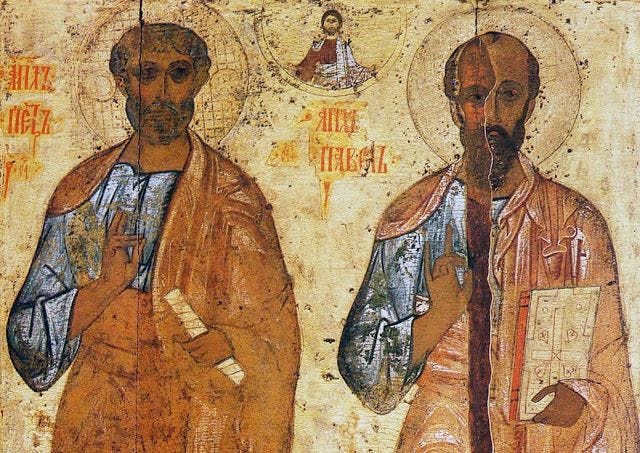
The Problem of Gospel-less Gospel-Centered Sermons

We are in an era of wonderful gospel-centered seminaries, gospel-centered books, gospel-centered ministries, and gospel-centered preaching. But we have a problem.
It’s great that people are preaching about Jesus and how salvation comes by grace through faith. Gospel-centered preaching helps people see how parenting, forgiveness, and serving are rooted in the gospel. We’ve learned to talk about Jesus and his work as the motivation for holiness, and as the means as well—the nuclear core of the Christian life. And I want to shout hallelujah as loud as anyone that our generation is making known that the whole Bible tells one story about our Carpenter King.
But none of that is the whole gospel.
My great concern is that while our generation has grown in preaching and teaching in a gospel-centered way, we are forgetting the whole gospel in the process. I fear we are losing and assuming the gospel in our attempts to be gospel-centered. We must realize the difference between preaching the effects and empowerments of the gospel and preaching the actual gospel event.
There are too many gospel-less gospel-centered sermons. And a sermon without the gospel is a barren wasteland, a sermon with no food, abuse to the sheep, and cruelty to the lost.
Is Jesus Alive In Your Sermon?
The second half of Easter weekend is the most neglected truth in sermons today. Without the resurrection of Jesus of Nazareth, there is no gospel, no Christianity, no point. Many preachers are proclaiming the cross of Christ, but where is the resurrection? When is the last time you heard an explicit heralding of the risen Lord Jesus outside of Easter Sunday?
Our gospel-centered movement has helped us avoid teaching like legalistic and graceless Pharisees. But now it seems many of us inadvertently sound like the Sadducees who didn’t preach a resurrection.
Faithful gospel preaching will not assume the gospel. It preaches both the cross and the resurrection—in every sermon. It is not enough to preach the cross alone, we must preach the risen Christ too. We must sound both notes. Theologian Michael Bird calls the resurrection of Jesus the “kerygmatic sequel” of the cross. The resurrection is vital to the faithful preaching of the gospel. As D. A. Carson states, “The entire Bible pivots on one weekend in Jerusalem about two thousand years ago. Attempts to make sense of the Bible that do not give prolonged thought to integrating the crucifixion and resurrection of Jesus are doomed to failure, at best exercises in irrelevance.” Attempts to preach God’s Word that do not integrate the crucifixion and resurrection are doomed, or at best will evaporate into the evangelical ether.

Paul tells us the simple and supernatural reality of the gospel message in 1 Corinthians 15. And this is the same message we must teach, preach, plant, counsel, evangelize, and encourage with:
“For I passed on to you as most important what I also received: that Christ died for our sins according to the Scriptures, that he was buried, that he was raised on the third day according to the Scriptures” (1 Corinthians 15:3–4)
We agree that the resurrection of Christ is not a part of the gospel we can ignore. So it also should not be a part of the gospel we neglect. We recognize that if there’s no cross, there’s no gospel. I hope we can also agree that if Jesus is still dead in our sermons, then there is no gospel.
No cross = No gospel
No resurrection = No gospel
No cross or resurrection in a sermon = Not a gospel sermon
Paul says, if Christ has not be raised, then we are dead in our sins and everything in Christianity is all in vain.
“If Christ has not been raised, then our proclamation is in vain, and so is your faith…And if Christ has not been raised, your faith is worthless; you are still in your sins.” (1 Corinthians 15:14, 17 CSB)
Sermons—whether on Easter Sunday or the middle of July—should note the same message in fresh ways: “Christ has died. Christ has risen. Christ will come again.” The cross alone isn’t what saves us. We need the entire Easter event. Christ’s ongoing heartbeat in the heavenly places (even now in the 21st century) is just as central to the triune God’s saving mission as Christ’s heart-stopping there at the place of the Skull in the 1st century. The blood spilled at Golgotha and the blood coursing through Christ’s glorified body is why Christians are no longer in their sins.
Witness to the Risen Lord
The fact that Jesus isn’t a pile of bone dust somewhere in Jerusalem is why you are reading this article. It’s why all of our churches exist, and it’s why you are a Christian. In fact, we only talk about the cross of Christ because of his empty tomb. Rome crucified thousands of people, but the Father only took one man who was crucified out of the grave and put him upon a throne. “It’s only the resurrection,” says N. T. Wright, “that makes the crucifixion appear anything other than a horrible end for another failed Messiah.” I will go so far as to say that we only know the name of Jesus of Nazareth because he rose again from the dead. If he were still dead, his name would be in the dumpster of history, scrapped and forgotten for good reason. But since he lives, everything is different.
C.S. Lewis tells us about the preaching of the early church:
“To preach Christianity meant primarily to preach the Resurrection…The Resurrection is the central theme in every Christian sermon reported in the Acts. The Resurrection, and its consequences, were the ‘gospel’ or good news which the Christians brought.”
When the Son of God told his apostles to be his witnesses to the ends of the earth (Acts 1:8), he commissioned them as witnesses of his resurrection. When the apostolic group replaced Judas, Peter said explicitly: “One of these men must become with us a witness to his resurrection” (Acts 1:22). The apostles received their job title from Jesus—“my witnesses”—and went about making disciples by being witnesses of his resurrection. They understood their mission as proclaimers of the man who rose from the dead. The rest of the Bible is the apostles doing just that—living out their Christ-commissioned job as witnesses of his resurrection.
I’m not saying you need to be preaching sermons that are only about the resurrection, or that you must preach sermons that are theologies of the resurrection, or even that the resurrection of Jesus must be the main point of your sermons. What I’m calling for is the kind of preaching that causes people to hear, notice, and reckon with the fact that Jesus is risen indeed.
Let’s preach the whole gospel event—Jesus died for you and Jesus is alive for you—in every sermon. In the words of one preacher to another:
“Remember Jesus Christ, risen from the dead” (2 Timothy 2:8 CSB)
This article was originally published at Phoenix Seminary. I've add a few more thoughts since the original post.
Resources on Preaching
The latest episode of The Acts 29 Podcast is all about preaching well. Mark South, Pastor at Living Stones Church in Sparks, Nevada, and I talk about what makes good preaching, what gospel preaching is, and the areas of growth we see as we assess and coach preachers. Check it out.
What Would the Puritans Say to Us Now? Learning from Puritan Prescriptions on Preaching
5 Preaching Pet Peeves | For The Church
What I Mean by Preaching
Preaching Christ or preaching about Christ?










